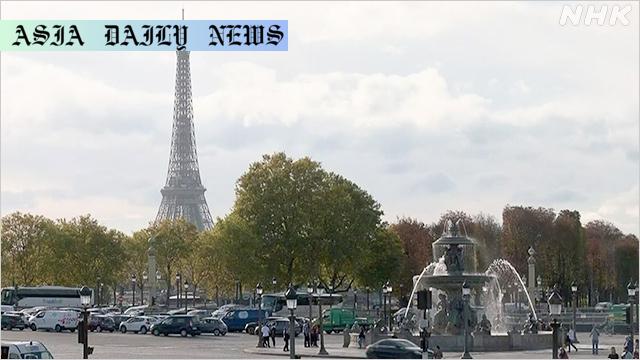Scientists, affected by US budget cuts, are welcomed by French universities offering funding and resources to continue critical research.
France welcomes US scientists affected by Trump administration’s budget cuts.
Centrale Supelec allocates €3M to help research in decarbonization.
French universities emphasize solidarity and freedom for researchers.
Belgium joins France in offering similar academic refuge programs.

France Welcomes Affected US Scientists
The recent budget cuts in the United States under President Donald Trump’s administration have significantly impacted the scientific research community. Areas such as environmental studies, medicine, and space science have faced noticeable setbacks, causing concern among global researchers. Among the most alarming measures was the abolishment of NASA’s Office of the Chief Climate Scientist, a decision that sent ripples of anxiety across the scientific ecosystem.
In a remarkable display of solidarity, France has stepped up, offering refuge and resources to US scientists whose research projects have been derailed by the tightening budget constraints. Several French educational institutions have declared their commitment to supporting these scientists, seeing the move as a win-win opportunity: the chance to bolster their national research output while showcasing academic freedom as a cornerstone of French values.
Centrale Supelec: Leading the Initiative
Centrale Supelec, one of France’s most renowned engineering schools, is at the forefront of this initiative. The institution has pledged a substantial €3 million (approximately $3.2 million) to absorb researchers from US universities, particularly those specializing in vital scientific fields like decarbonization technologies. By providing these scientists with state-of-the-art equipment and renewed budgets, Centrale Supelec aims to keep pivotal research on track, potentially unlocking innovative solutions for global challenges like climate change.
Romain Soubeyran, Managing Director of Centrale Supelec, described this initiative as a “win-win situation.” He highlighted how researchers are indispensable assets to any nation, emphasizing the importance of academic freedom in fostering breakthroughs. According to Soubeyran, France’s commitment to safeguarding this freedom reinforces its reputation as a global champion for science and innovation.
Broader Uptake Across Europe
The French initiative has inspired similar actions elsewhere. Neighboring Belgium has also announced a program aimed at attracting scientists facing challenges in their home country. In addition, French universities report overwhelming interest, with over 60 applications already submitted by US-based researchers eager to continue their work in a supportive environment. Interviews for prospective candidates are underway, promising an influx of skilled professionals that could accelerate Europe’s scientific progress.
Despite being geographically displaced, these scientists bring invaluable expertise to Europe’s academic and research landscape. This collective effort by European institutions could set a precedent for addressing the global challenges of funding and bureaucracy in science.
Implications of the French Strategy
France’s proactive stance doesn’t just strengthen its scientific community but also addresses global concerns. With pressing global issues like climate change requiring collaborative efforts, this initiative ensures that vital research continues uninterrupted. The focus on decarbonization, for instance, aligns with international environmental goals, reaffirming France’s role as a key player in driving green technologies.
Moreover, this move sends out a powerful message to the world: that intellectual freedom and innovation thrive in environments where scientists are supported and valued. By attracting some of the brightest minds from the US, France is increasing its intellectual capital, which could have long-term benefits for European research and global cooperation.
The Path Forward
As the effects of US budget cuts unfold, it is crucial to watch how other countries respond to similar challenges. By welcoming displaced scientists, France and Belgium have set an example of how nations can exhibit proactive leadership in times of international crisis. This collaborative spirit could serve as a blueprint for repairing fragmented research ecosystems worldwide.
Ultimately, the initiative highlights an inspiring narrative: when barriers are placed on innovation, there are always alternative avenues that foster progress. As French institutes absorb these scientists, the knowledge shared and generated will benefit a broader spectrum, ensuring no critical research is left behind.
Commentary
Resilience of the Global Scientific Community
The French initiative to support American scientists in the face of budget cuts demonstrates the resilience and interconnectedness of the global scientific community. By stepping in to ensure that critical research projects continue unhindered, France has proven its commitment to driving progress in areas that impact us all, such as climate change and medicine. This move also highlights an important aspect of research: it is not confined by borders, and collaboration is the key to solving humanity’s most pressing problems.
Impacts of Budget Cuts on Innovation
Budget cuts, particularly in research-intensive areas, often have far-reaching consequences. The United States, once considered a leader in scientific advancement, risks falling behind as policies de-prioritize innovation. The abolishment of NASA’s Office of the Chief Climate Scientist is a prime example of short-sighted decision-making that neglects the broader implications of such actions. Fortunately, initiatives like those in France provide a safety net, but they also bring into question how sustainable these moves are without broader global collaboration.
A Call for Collaborative Leadership
France’s decision to support American researchers is not just an act of solidarity but also a call to action for other nations. The global challenges we face, from climate change to pandemics, require collective efforts driven by open dialogue and unrestricted research. By welcoming displaced scientists, France and its European counterparts are setting a precedent that others should follow. This isn’t just about research; it’s a reflection of shared responsibility and the acknowledgment that innovation knows no borders.
Conclusion: A Hopeful Path Forward
Ultimately, France’s initiative provides a silver lining in what could otherwise have been a dark chapter for science. It offers hope that even in challenging times, opportunities can arise, fostering innovation and progress where it may have otherwise stagnated. The world should take note, as this collaborative model could pave the way for scientific resilience and shared global advancement in the years to come.


